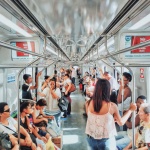Sustainable cities and settlements are safe, provide for mobility, ensure access to resources, have accessible green and public space, and provide economic opportunities for all. They practice inclusive, gender-responsive planning that incorporates climate change. In short, they do not make themselves; they require vision, planning, cooperation, attention to human rights and an understanding of the inequalities that can be perpetuated by – or addressed by – the city.
Cities are a paradox. Urbanization is associated with high economic output and wealth creation but also deep economic divisions and entrenched gender inequalities that keep wealth in the hands of the few. They have high emissions and energy usage, but strong mitigation and efficiency potential – with immense opportunity for creativity but dangers of ‘locking in’ unsustainable, inequitable or obsolete infrastructure.
GENDER & SUSTAINABLE CITIES
Gender inequalities and gender roles often make women’s needs, desires and rights invisible. Gender gaps and discrimination exist in cities, as elsewhere, but they can be magnified in urban areas: gender gaps exist in employment, decent work, informal work, pay, land tenure rights, access to and control of productive assets, personal security and safety, health care, reproductive and sexual health rights, and representation in formal structures of urban governance. All of this means that even a prosperous city can easily leave women behind.
Climate change, sustainable development and gender equality must be pursued in tandem in order to address gender-differentiated needs and ensure that transportation, infrastructure, policy development, service provision and environmental sustainability respond to women and men of all ages, races, abilities, economic status and geographical location.
Related: Read the brief on the intersection of gender, climate and transport:




